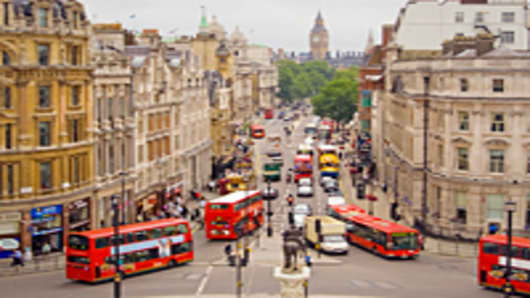The Olympics is creating a “ghost town” effect in central London as visitors who would normally flock to the capital’s shops, hotels and theatres stay away, casting doubt on expectations of a short-term economic boost from the games.
The gameshave attracted as many as 100,000 foreign visitors to London — more than in previous Olympics. But, on its own, that number significantly lags behind the estimated 300,000 foreign tourists who could be expected in a typical year.
Theatres are among the businesses suffering most from emptier streets.
“We’re bleeding, darling,” said Nica Burns, chief executive of Nimax Theatres. “For my six theatres, last week was the worst this year. I think the Olympics are great — but I feel like I’ve been the bullseye for the archery competition.”
Ms Burns forecast that ticket sales at her company’s six West End theatres would be down 30 percent over the summer.
London’s top museums and tourist attractions are also feeling the pinch. The Association of Leading Visitor Attractions, the body representing them, reported a fall of 30-35 percent in attendance over the past two weeks, compared with last year.
Bernard Donoghue, ALVA’s chief executive, said its members — who include the British Museum, the Tower of London and the Science Museum — “have been trying to compensate by telling people there are fewer queues and longer opening hours”.
Transport for London, the public body that runs the capital’s Underground and road network, has been warning for monthsof heavy disruption over the summer in central London and urging travelers to avoid transport hubs and plan alternative routes. The voice of Boris Johnson, London’s mayor, has boomed from station platforms warning of the imminent “huge pressure” on the transport system.
TfL said estimates of journeys on the Tube were up 4 percent on Monday from normal traffic.
In response to slow bookings, hotels have now cut prices. Research by Hotels.com said prices in London during the Olympics had fallen around 25 percent in a two-week period in June.
Nick Palan, managing director for Golden Tours, an open-top tour bus company, said: “It’s totally destroyed the market for us this summer. The hotels put up prices heavily earlier in the year and some of the larger tour companies literally stopped selling London back in May. We’re down by over 20 percent.”
David Cameron, prime minister, has said 13 billion pounds of economic investment should flow from the games over four years, some of which is from tourism.
But in the short term, the benefits are more elusive. Mark Field, a London Conservative MP, said: “The message has been going out for months that London would be packed to the rafters — and the transport system would be under pressure — and that has put a lot of people off. The high-end hoteliers are fine because of all the official Olympic guests but many others have not benefited so much.”
Mr Donoghue of ALVA said the body had asked TfL to alter its advice to travelers: “As long as you avoid peak times and stations, London is surprisingly accessible and open for business.”


